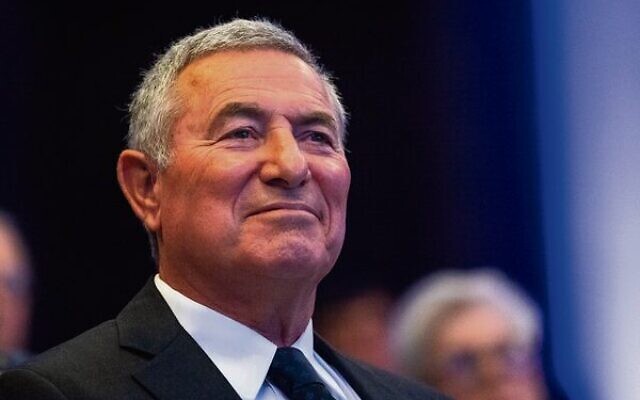IDF hero and October 7 survivor guests
"It seems October 7 gave permission to antisemites, all those around the world, saying look how easy it is to slaughter and massacre Jews," says Doron Almog.

In triumph and grief, IDF Major-General (Res) Doron Almog’s life has mirrored a large swathe of Israel’s history.
The chairman of the Jewish Agency for Israel (JAFI), who will visit Sydney, Melbourne and Perth as a special emissary for this year’s United Israel Appeal campaign, alongside October 7 survivor Michal Uziyahu, has led a storied life.
Almog commanded a taskforce hunting terrorists who killed Israeli athletes at the 1972 Munich Olympics, led a paratrooper battalion in the Yom Kippur War, and was first on the ground in the 1976 rescue of hostages at Entebbe airport, Uganda. He was at the helm of Operation Moses, the secret airlift of Ethiopian Jews from war-torn Sudan to Israel in 1984-85.
But for the IDF doyen, awarded the Israel Prize in 2016, his country’s jagged history has left scars. His brother Eran died in the Yom Kippur War. Five members of his family were killed in a terrorist explosion at the Maxim restaurant in Haifa in 2003 during the Second Intifada. And four family members were hostages abducted to Gaza on October 7, since freed.
Speaking to The AJN ahead of his second Australian visit, Almog – asked how his military and personal experiences resonate within him – described a shared Jewish fate; Jews in Israel and the Diaspora looking out for one another in “the biggest crisis of the State of Israel and the Jewish people since the establishment of the state”.
“It seems October 7 gave permission to antisemites, all those around the world, saying look how easy it is to slaughter and massacre Jews.”
Almog spoke of a compact between Israel and the Jewish world, of “understanding that Jews are stronger all over the world with a strong Jewish state”.
For Almog, who headed the IDF’s southern command on the Gaza border in 2000-03, the October 7 ambushes represented “a huge failure of all levels of leadership”. But Israel’s military response has been vigorous. The IDF has done much “to destroy Hamas infrastructure and is mopping up terrorists”.
Militarily, the greatest remaining challenge is the Rafah corridor.
He admitted to a heartrending debate in Israel about the moral imperative of freeing the 134 remaining hostages while not acceding to Hamas demands to release thousands of its terrorists. He noted Yahya Sinwar, now Hamas chief, was among terrorists released in 2011 to free IDF soldier Gilad Shalit.
Almog outlined his mission to Australia. “Number one is to strengthen the Jews in Australia … to tell them Israel is a partnership between Jews all over the world and those who are living here in Israel. … Number two, I’m coming to tell Jews in Australia that we need you more than ever before.”
Among the greatest challenges is the rehabilitation of Israelis displaced by terror attacks in the south and north, an effort led by JAFI and housing management operator Amigour on a massive infrastructure program.
But to re-fortify Israel will require more than bricks and mortar, said Almog. “To strengthen the south and the north, it’s highly important to attract young Jews from all over the world.”
Visiting Australia with Almog will be Michal Uziyahu of the Eshkol Regional Council, which consists of 32 communities along the Gaza border.
Recounting October 7, she told The AJN, “It’s something we cannot imagine would ever happen in our lives. Suddenly we were placed in a position in which we need to mourn, while learning how we can grow out of this as survivors. Yes, it’s hard, but we know we are not alone … we have you right next to us – Jewish communities and friends of Israel around the world.”
UIA NSW Gala Event, Sunday 3 March, 5.30pm for 6pm start
Bookings: uiaaustralia.org.au/event/2024-uia-nsw-gala-event
Enquiries: (02) 9361 4273 | info@uiansw.org.au

comments